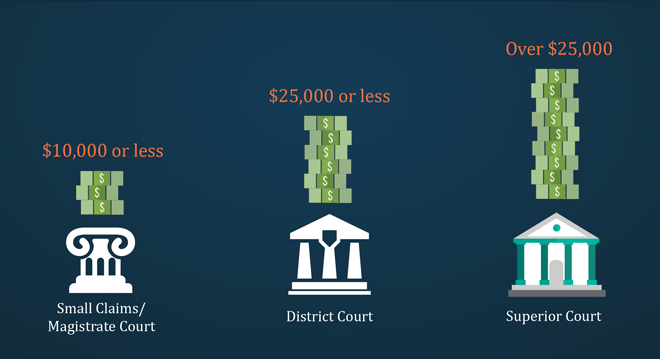
How to File a Civil Suit - A Roadmap to Trial in NC Civil Court
If you're curious how to file a civil lawsuit in NC, the process can be simplified and expidited with the assistance of an experienced lawyer.
How to Start a Civil Suit
The complexity of civil litigation in North Carolina can be overwhelming. Understand the basic process in a civil litigation case and the steps involved are the first steps to familiarizing yourself with learning how to file a civil lawsuit in NC. While learning how to file a civil lawsuit in NC is one matter, actually filing the lawsuit is another. Whether you’re pursuing a civil lawsuit or you’re the defense, having an experienced attorney break down the process and timeline will pay dividends. At The Doyle Law Offices, lead attorney Hank Doyle has been practicing law in North Carolina since 1995. With decades of hands-on experience and hundreds of real-life civil cases, we can help you navigate your way through legal waters. From Alternative Dispute Resolutions (ADR) including business litigation and family matters to filing a restraining order, the need for a civil lawsuit is warranted in various instances.
From filing the suit to meeting in court, take a closer look at the NC civil court process as The Doyle Law Offices outlines a typical civil lawsuit at the Superior Court level.

Levels of Civil Court
In North Carolina, there are three levels of trial court that handle civil litigation: Small Claims/Magistrate Court, District Court, and Superior Court. What warrants a case to be filed on the Superior Court level?
A key factor in determining which level of court to litigate a case depends on the dollar amount being disputed.
- Small Claims/Magistrate Court is the lowest level, handling disputes involving up to $10,000.
- District Court is the next level, which handles disputes up to $25,000.
- Superior Court is the upper level trial court, and handles disputes over $25,000.
How to File a Civil Lawsuit in NC: The Path to Superior Court
Civil litigation isn’t always black and white, but the general steps that occur along the path to a trial in Superior Court are.

1. Complaint: The Start of a Civil Lawsuit
A civil lawsuit is initiated when the Plaintiff (the party that initiates the lawsuit) files a complaint. To file a complaint, a document is prepared by a civil litigation attorney, which outlines the facts and defines the legal remedies being sought. If you're unsure how to file a civil lawsuit in NC, The Doyle Law Offices can help you get navigate your way.
If the Plaintiff is seeking more than $25,000, the case will usually be filed in Superior Court. In North Carolina, the Clerk of Court charges a $200 fee for the complaint to be filed.

2. Service: Delivery of the Summons & Complaint to the Defendant
Next, the Plaintiff’s attorney has to obtain proper delivery of the summons and complaint to the Defendant (the party being sued). The summons is a document issued by the Clerk that accompanies the complaint, and puts the Defendant on official notice that a lawsuit has been filed against them.
Proper delivery of these documents to the Defendant is known as service of process. Service can be obtained in several ways, including delivery by the sheriff or by certified mail.

3. Responsive Pleading: 30 Days for the Defendant to Respond
Once the Defendant has been served, the Rules of Civil Procedure allow him/her 30 days to file an answer or other response (such as motion to dismiss). This is known as the responsive pleading.
There is a procedure to obtain an additional 30 days to file this response, but these deadlines are strict and failing to act in time can greatly hinder your case.

4. Discovery: Information Gathering & Depositions to Build the Case
After the Defendant has filed their answer, the process of discovery takes place. The purpose of discovery is to allow time for both sides to gather information on the case and learn as much as possible about the facts so they can adequately try their case before the judge or jury. As you are learning how to file a civil lawsuit in NC, your attorney will help you gather evidence that will best vouch for your arguement.
In the discovery phase, the lawyers for both sides exchange written questions and requests for copies of documents. Each side is legally required to provide their answers and render the requested documents.
Often, depositions are taken, where the attorneys question parties and witnesses under oath, and the answers are transcribed for later use in court.

5. Mediation: An Attempt to Settle Outside the Courtroom
The last step on the path to Superior Court trial, most lawsuits in the Superior Court Division are ordered to mandatory mediation. As you learn how to file a civil lawsuit, you may find that a mediation, a settlement out of the court room, is the best course of action. The idea of mediation is to attempt to resolve the dispute outside of the courtroom, and help litigants arrive at a compromise settlement.
Typically, the attorneys for the two sides agree on a third party mediator to preside over the mediation conference. Mediators are often other lawyers or retired judges that have had specialized training in dispute resolution.
A mediated settlement is often beneficial to both sides and avoids taking the case to trial, saving everyone involved time and resources.

6. Trial: Settling the Case in Superior Court
If the parties cannot come to an agreed resolution in mediation, then the case moves forward to trial.
At the trial, the Plaintiff’s and Defendant’s attorneys will present their cases to a Superior Court judge and jury, who will preside over the court and hand down the ruling.
Civil litigation rules are complex, which is why working with an experienced lawyer pays dividends when you are facing the prospect of litigation in Superior Court. As you learn how to file a civil lawsuit in NC, you'll navigate gathering information, mediation, and more as you work with your attorney. At The Doyle Law Offices, lead attorney Hank Doyle has been practicing law for 28 years and has hands-on experience with the Superior Court's civil litigation system. Civil law attorney Hank Doyle has represented Cary, Raleigh, Apex, Wake Forest , and Rolesville clients in Superior Court civil litigation cases for decades and is ready to learn more about your case. Whether you want to learn more about how to file a civil lawsuit in NC or you are ready to schedule a legal consultation, give our law firm a call today at (984) 235-1067 or fill out the form below.

